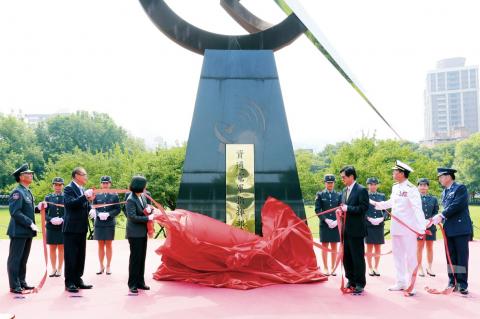The threat from state-sponsored cyberattacks on the nation’s digital infrastructure, including those directed by Beijing-affiliated groups, has increased in sophistication and severity over the past year, the Department of Cyber Security said yesterday.
Last year, Chinese hackers mounted 288 successful cyberattacks on the government’s systems, or 80 percent of the total of 360 successful attacks that the department discovered, department Director Chien Hung-wei (簡宏偉) said.
Each month, the government’s systems are subjected to anywhere between 20 million and 40 million attacks, in addition to billions of probing actions made by hackers looking for weaknesses, he said.

Photo: courtesy of Military News Agency
These actions are initiated by hackers from around the world, though groups based in China are believed to be involved in many of them, Chien said.
The overwhelming majority of cyberattacks are level 1 or level 2 events that result in unauthorized changes to Web pages or other minor damage, he said.
However, the government’s digital domains suffered 10 level 3 incidents, which might have compromised personal data stored on the affected systems, he said.
While there were no successful level 4 attacks — the highest threat level — against the nation’s infrastructure, Chinese hackers had improved the success rate of their attacks, he said.
“The increasing precision of Chinese attacks is a matter of concern for this department,” Chien said.
Hackers route their attacks through servers in the US, Russia, EU member states and other nations, which makes pinpointing an attack’s point of origin difficult, he said.
However, the department is able to identify specific patterns, traits and other modes of operation that are associated with China-sponsored hackers, including the presence of certain characters or styles of coding used in hacking tools, he said.
Hackers from China, North Korea and Russia have been highly active, and Taiwan often serves as a testing ground for new hack tools or techniques before their deployment against targets in other nations, he said.
As a result, foreign governments have expressed an interest in gaining access to the information the department has collected on cyberattacks directed against Taiwan, he said.
The department is overseeing the government’s efforts to develop a system of defense to shield its core computer systems, infrastructure and sensitive data from cyberattacks, Chien said.
The defensive system would involve building up defenses at each of the government’s Web portals and each of the office domains connected to them, he said.
Furthermore, government offices need to communicate with each other and share information about cyberattacks to coordinate their security efforts and discern emerging threats, he said.
An academic, on the day of being nominated a Cabinet official, had received an e-mail with an embedded virus that was designed to penetrate the government’s internal networks, said an official, who asked not to be named.

CHAOS: Iranians took to the streets playing celebratory music after reports of Khamenei’s death on Saturday, while mourners also gathered in Tehran yesterday Iranian Supreme Leader Ayatollah Ali Khamenei was killed in a major attack on Iran launched by Israel and the US, throwing the future of the Islamic republic into doubt and raising the risk of regional instability. Iranian state television and the state-run IRNA news agency announced the 86-year-old’s death early yesterday. US President Donald Trump said it gave Iranians their “greatest chance” to “take back” their country. The announcements came after a joint US and Israeli aerial bombardment that targeted Iranian military and governmental sites. Trump said the “heavy and pinpoint bombing” would continue through the week or as long

TRUST: The KMT said it respected the US’ timing and considerations, and hoped it would continue to honor its commitments to helping Taiwan bolster its defenses and deterrence US President Donald Trump is delaying a multibillion-dollar arms sale to Taiwan to ensure his visit to Beijing is successful, a New York Times report said. The weapons sales package has stalled in the US Department of State, the report said, citing US officials it did not identify. The White House has told agencies not to push forward ahead of Trump’s meeting with Chinese President Xi Jinping (習近平), it said. The two last month held a phone call to discuss trade and geopolitical flashpoints ahead of the summit. Xi raised the Taiwan issue and urged the US to handle arms sales to

BIG SPENDERS: Foreign investors bought the most Taiwan equities since 2005, signaling confidence that an AI boom would continue to benefit chipmakers Taiwan Semiconductor Manufacturing Co’s (TSMC, 台積電) market capitalization swelled to US$2 trillion for the first time following a 4.25 percent rally in its American depositary receipts (ADR) overnight, putting the world’s biggest contract chipmaker sixth on the list of the world’s biggest companies by market capitalization, just behind Amazon.com Inc. The site CompaniesMarketcap.com ranked TSMC ahead of Saudi Aramco and Meta Platforms Inc. The Taiwanese company’s ADRs on Tuesday surged to US$385.75 on the New York Stock Exchange, as strong demand for artificial intelligence (AI) applications led to chip supply constraints and boost revenue growth to record-breaking levels. Each TSMC ADR represents

State-run CPC Corp, Taiwan (CPC, 台灣中油) yesterday said that it had confirmed on Saturday night with its liquefied natural gas (LNG) and crude oil suppliers that shipments are proceeding as scheduled and that domestic supplies remain unaffected. The CPC yesterday announced the gasoline and diesel prices will rise by NT$0.2 and NT$0.4 per liter, respectively, starting Monday, citing Middle East tensions and blizzards in the eastern United States. CPC also iterated it has been reducing the proportion of crude oil imports from the Middle East and diversifying its supply sources in the past few years in response to geopolitical risks, expanding